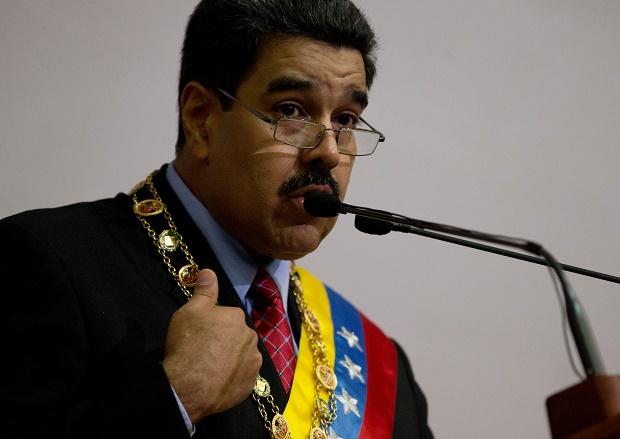Venezuela’s Maduro admits economic ‘catastrophe’

Venezuela’s President Nicolas Maduro delivers his annual state of the nation report, in Caracas, Venezuela, Friday, Jan. 15, 2016. Ahead of a surprise dire economic data release, Maduro said he would declare an economic emergency giving him 60 days to unilaterally enact sweeping reforms. The decree will be debated in the newly-seated opposition congress next week. AP Photo
CARACAS, Venezuela—Venezuelan President Nicolas Maduro admitted before a hostile legislature Friday that the oil-rich nation is mired in a “catastrophic” economic crisis, hours after decreeing a two-month state of emergency.
Maduro’s first state of the nation address before the newly opposition-held National Assembly, which is locked in a bitter power struggle with his administration, came as Venezuela’s central bank released its first economic growth and inflation statistics in more than a year.
READ: Venezuela president to face rivals in state address
The figures show the magnitude of the country’s recession: the economy shrank 4.5 percent in the first nine months of 2015, the central bank said, while inflation for the same period came in at a painful 108.7 percent, fueled by crippling shortages.
“These catastrophic figures (are) the result of an economic situation that in another era of regressive neoliberal and capitalist policies would surely have pushed (the Venezuelan) people into unemployment,” said Maduro.
Article continues after this advertisementEarlier, the leftist leader sought to seize the initiative in his standoff with the legislature, decreeing a 60-day state of “economic emergency.”
Article continues after this advertisementREAD: Venezuela sinks deeper into messy political crisis
It gave the administration special temporary powers to boost production and ensure access to key goods, including taking over private companies’ resources, imposing currency controls and “other social, economic or political measures deemed fitting.”
Addressing the legislature, Maduro said the plunge in oil prices over the past year and a half had the country trapped in an “economic storm” that pitted two models against each other.
“The socialist model is the only one, not the neoliberal model that wants to come and privatize everything,” he said to jeers from opposition lawmakers.
“You will have to come and overthrow me if you want to pass a privatization law. No, no and no!”
Dressed in his red, yellow and blue presidential sash, Maduro periodically sipped from a white coffee cup, as his mentor, late leftist firebrand Hugo Chavez, used to do.
At other points, Maduro sounded a more conciliatory note, saying he was ready for dialogue.
Addressing the issue of what the opposition calls political prisoners from within its ranks—one of its most acrimonious disputes with Maduro—the president said: “We are ready and willing to talk about this and any other issue necessary to discuss for the peace that Venezuela demands of us.”
‘Wrong-headed model’
National Assembly speaker Henry Ramos Allup, a fierce Maduro opponent, delivered a scathing rebuttal to his address.
“For 17 years, we’ve followed a wrong-headed economic model. Here are the numbers to prove it,” he said, referring to the new statistics.
Venezuela has the world’s biggest known oil reserves, but the current price slide has slashed its revenues, straining Maduro’s policies of oil-fueled social spending.
The current National Assembly, inaugurated 10 days ago, is the first controlled by the opposition since Chavez came to power in 1999.
Institutional arm-wrestling threatened to paralyze the legislature until last-minute compromises set the stage for Maduro to deliver his annual presidential report.
After the opposition won a landslide election victory last month, Maduro secured a Supreme Court injunction reducing its majority from two-thirds to three-fifths, limiting his rivals’ powers to force him from office as they have vowed.
The opposition Democratic Unity Roundtable (MUD) initially defied what it calls the pro-Maduro court.
But it bowed to pressure from the judiciary Wednesday, when three of its lawmakers agreed to quit while authorities investigate them over the Maduro camp’s allegations of electoral fraud.
Leaders have been wary of fanning tensions, mindful of deadly street clashes in 2014.
The so-called “supermajority” would have allowed the opposition to launch constitutional measures to cut short Maduro’s mandate, which expires in 2019.
Maduro accuses capitalist forces of waging “economic war” on Venezuela by starving it of goods.
Analysts say the political deadlock threatens to worsen the hardship that drove voters to the opposition.
“If Maduro’s discourse continues to be the same, the only way the results can change is by getting worse,” said economist Luis Vicente Leon.
On the streets, some Venezuelans were fed up with both sides.
“This just keeps getting worse. Now they’re going to deal with the problem even less because they’re fighting over the Assembly,” said Juan Molina, a 44-year-old security guard.
“I don’t know how this place is going to end up.”